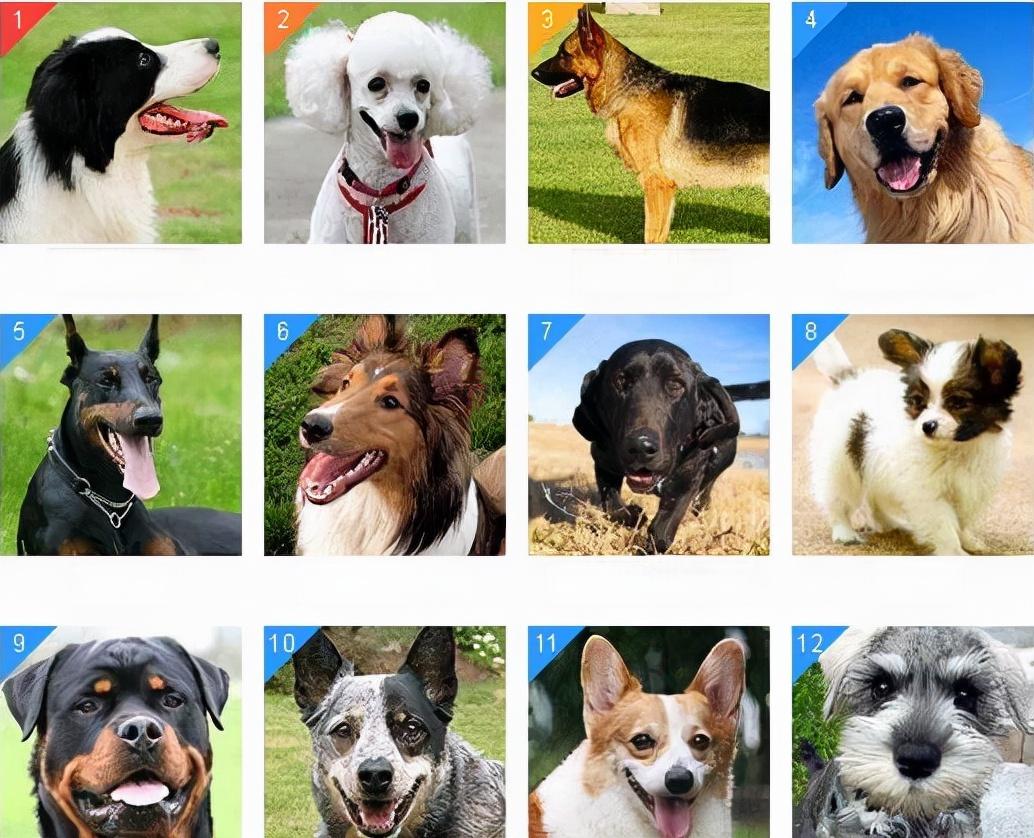Dog intelligence refers to a dog’s ability to learn, solve problems, and follow commands. Different breeds exhibit varying levels of intelligence, with some excelling in quick learning and obedience, while others may require more time to understand instructions. Dog intelligence rankings classify dogs based on these abilities, offering insights into how breeds differ in their cognitive skills.

This measures a dog’s ability to perform tasks and obey commands:
Learning New Commands:
Highly intelligent dogs can learn new commands in less than five repetitions.
Command Execution:
Smart dogs have a success rate of 95% or higher in following commands.
This evaluates a dog’s problem-solving skills and ability to adapt to new situations.
This assesses a dog’s innate abilities, such as herding, hunting, or guarding, based on its breed’s original purpose.
A dog’s ability to interact with humans and other animals also plays a role in intelligence evaluation.
Intelligence Highlights: Border Collies are ranked first for their exceptional herding abilities and quick learning.
Strengths: They learn new commands in fewer than five repetitions and execute them with 99% accuracy.
Intelligence Highlights: Poodles are not only smart but also highly adaptable.
Strengths: Known for excelling in tasks like search and rescue due to their trainability.
Intelligence Highlights: German Shepherds are renowned for their obedience and loyalty.
Strengths: Widely used in police and military work for their problem-solving skills.
Intelligence Highlights: Golden Retrievers are gentle, intelligent, and excellent at retrieving objects.
Strengths: Ideal as service dogs due to their friendly nature and quick training ability.
Intelligence Highlights: Dobermans are alert and quick thinkers, making them exceptional guard dogs.
Strengths: Highly loyal and responsive to training.
Intelligence Highlights: Shelties are agile and excel in herding tasks.
Strengths: Perform exceptionally well in dog sports and competitions.
Intelligence Highlights: Labradors are friendly, intelligent, and highly trainable.
Strengths: Popular as guide dogs and search-and-rescue dogs.
Intelligence Highlights: Despite their small size, Papillons are highly intelligent and eager to please.
Strengths: Capable of understanding complex commands.
Intelligence Highlights: Rottweilers are steady, confident, and highly trainable.
Strengths: Often used as guard and police dogs due to their reliability.
Intelligence Highlights: Australian Shepherds are energetic and incredibly smart.
Strengths: Known for their ability to perform high-focus tasks, especially in herding.
While not in the top tier, these breeds demonstrate decent learning abilities:
Traits: Playful but stubborn, requiring patience during training.
Traits: Independent and strong-willed, often challenging to train.
Traits: Affectionate but can be slow to learn new commands.
Traits: Loyal but stubborn, better suited for simple commands.
Some breeds are considered “less intelligent,” but this often relates to their independent nature rather than a lack of cognitive ability.
Traits: Elegant yet independent, often uninterested in training.
Traits: Aloof and stubborn, making them less responsive to commands.
Traits: Highly independent and prefers doing things its own way.
Traits: Affectionate but lacks interest in complex tasks.
A dog’s breed plays a significant role in its intelligence. Working breeds, for instance, tend to rank higher.
Proper training and consistent interaction can significantly enhance a dog’s cognitive abilities.
Even within the same breed, individual dogs may exhibit varying levels of intelligence.
High-intelligence breeds suit owners who enjoy engaging their dogs in training and activities. Lower-intelligence breeds may be better for families seeking low-maintenance pets.
Smarter breeds require more mental stimulation and physical exercise to prevent boredom and destructive behavior.
Early socialization can improve even lower-intelligence breeds' ability to follow commands and integrate into family life.
They are based on criteria such as workability, command-following success rates, adaptability, and social interaction skills.
Smart dogs learn commands quickly, obey reliably, and exhibit problem-solving abilities.
Not at all. Lower-ranked dogs may be independent or less motivated to follow commands but excel in other areas, such as emotional bonding.
They provide general guidelines but may vary based on individual dog behavior and training.
Yes, with consistent training, mental stimulation, and positive reinforcement, a dog can develop better problem-solving and obedience skills.
Dog intelligence rankings provide valuable insights into different breeds’ learning and problem-solving abilities. While high-intelligence breeds may excel in obedience and training, lower-ranked breeds often have unique qualities that make them just as lovable. By understanding a dog’s strengths and challenges, owners can provide the best care, creating a strong bond and fulfilling life for their canine companions.
animal tags: dog
We created this article in conjunction with AI technology, then made sure it was fact-checked and edited by a Animals Top editor.